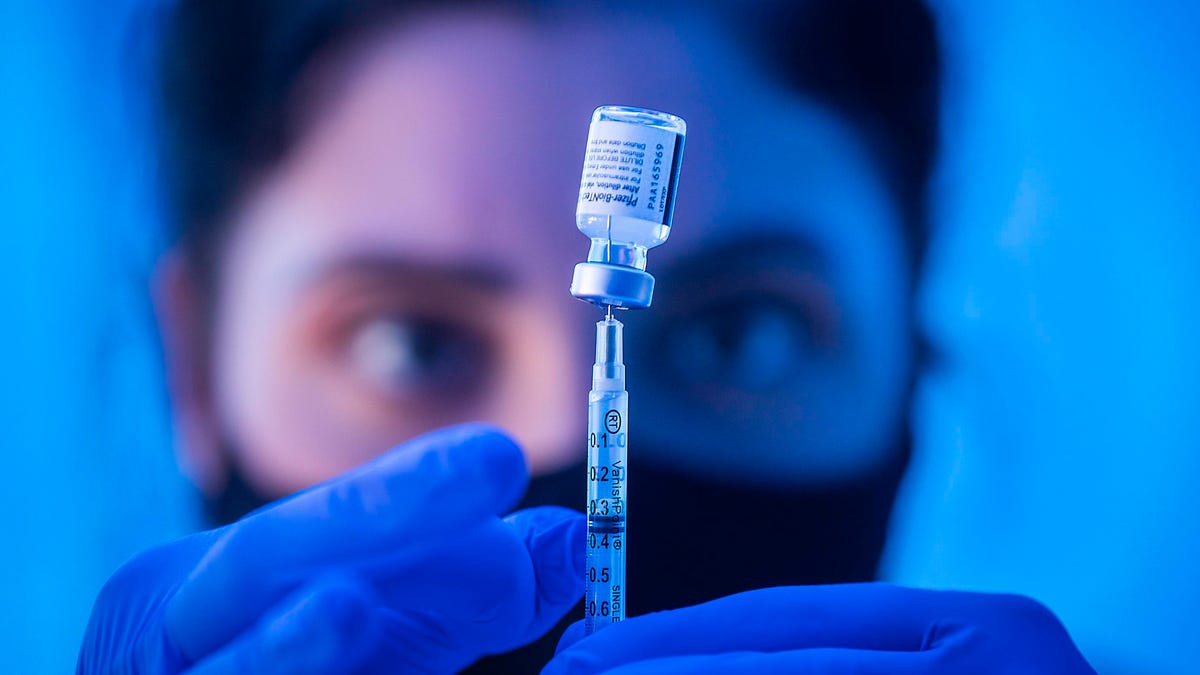Pfizer, BioNTech Will Develop mRNA Shingles Vaccine After Covid-19 Shot Success
nTopline U.S. pharma giant Pfizer and German biotech BioNTech are teaming up to develop an mRNA vaccine for shingles, the companies announced Wednesday, building off the successes of their joint Covid-19 shot as vaccine makers rush to invest in the newly proven mRNA technology.
Pfizer and BioNTech are teaming up to make a shingles vaccine.
Los Angeles Times via Getty Images Key Facts If successful, the vaccine could be the first mRNA shot for preventing shingles, a painful disease that typically occurs in older adults when the virus that causes chickenpox reactivates after lying dormant in the body for years.
The companies said they expect to begin clinical trials of the vaccine in the second half of 2022.
The shot will combine BioNTech’s mRNA technology—used in the pair’s Covid-19 vaccine—and Pfizer’s research on antigens, which train the immune system.
BioNTech will receive an upfront equity investment of $150 million and upfront payment of $75 million from Pfizer as part of the deal, the companies said, in addition to milestone payments of up to $200 million and a share of profits from future sales.
Pfizer will receive an upfront payment of $25 million for its antigen work from BioNTech.
Surprising Fact This marks the third collaboration between BioNTech and Pfizer. While most well known for their Covid-19 shot, the two began collaborating on an mRNA flu vaccine in 2018.
Key Background While there are shingles vaccines on the market right now, Pfizer and BioNTech said mRNA technology provides the “opportunity to develop an improved vaccine” that could also be more efficient to produce. They are not the only vaccine makers to see potential in the technology—which was proven during the Covid-19 pandemic after decades of research (Moderna’s shot is also based on mRNA)—with heavyweights like Sanofi and GSK investing heavily in the field. mRNA technology has the allure of potentially faster, more flexible vaccine production. While most vaccines work by introducing part of a disease-causing organism, which has been weakened or inactivated, into the body to trigger an immune response—which can have a costly, lengthy and onerous development process—mRNA vaccines introduce genetic material that instructs cells in the body to make proteins that trigger the immune system, eliminating the need to grow organisms and allowing shots to be easily edited should the need arise.
Crucial Quote Mikael Dolsten, Pfizer’s chief scientific officer, Pfizer, said the agreement means the two companies are continuing “on our journey of discovery together, by advancing mRNA technology to tackle another health challenge ripe for scientific innovation, supported by our world-class manufacturing network.”












 Bitcoin
Bitcoin  Ethereum
Ethereum  Tether
Tether  XRP
XRP  USDC
USDC  Solana
Solana  TRON
TRON  Dogecoin
Dogecoin  Lido Staked Ether
Lido Staked Ether